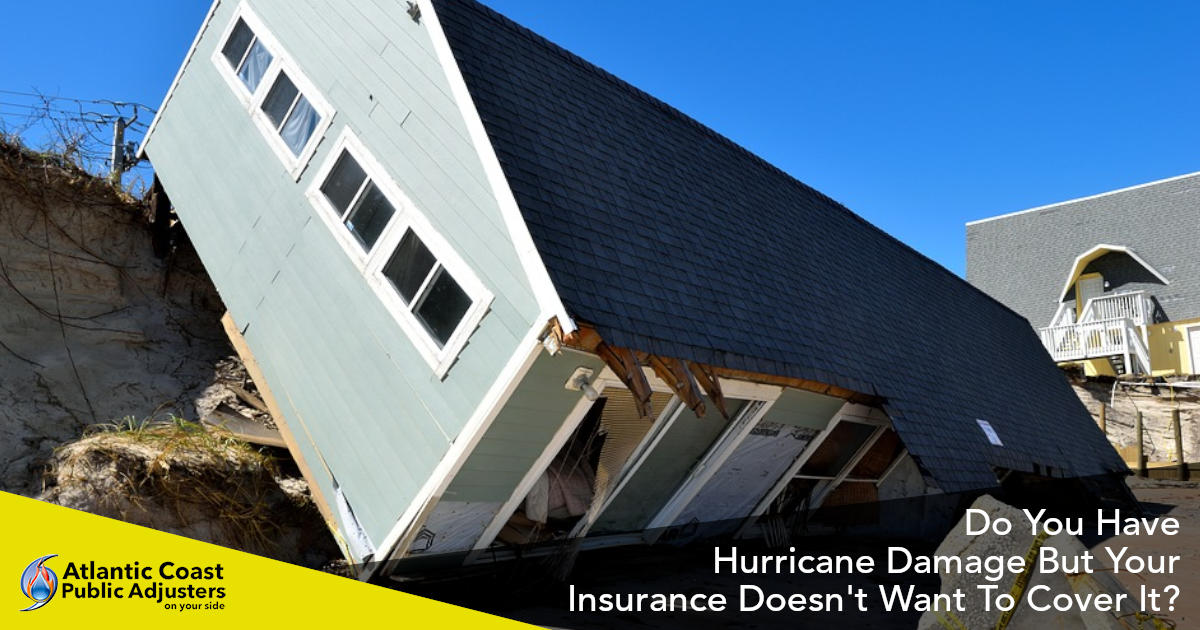Do You Have Hurricane Damage But Your Insurance Doesn’t Want To Cover It?

Hurricanes cause substantial damage to many homes every year in the United States. Regardless of the building requirements, regulatory bodies have put in place, you cannot always anticipate the amount of damage a natural disaster brings. This is one of the biggest contributing factors towards homeowner’s insurance. But what if your insurance company refuses to pay out after hurricane damage has occurred?
Why Won’t My Insurance Cover The Damage?
Homeowners should be covered from some or all of the damage caused by a hurricane. Flood damage is often excluded by insurance companies, in the fine print of their policies. However, if flood damage occurred as a result of a hurricane, considering the following factors.
Location
Where your home is located in relation to the path of the storm, coastal or inland.
Cause
What was the cause of the damage? Wind, rains brought by wind, other sources of water in your home, falling objects like trees will all be considered.
Exclusions In Your Policy
Apparent exclusions during a hurricane claim can be frustrating. All policies have exclusions. You need to read the fine print from the get-go and more importantly during the claims process. There are ways that insurance companies will try to get around this but this is not always fair to the insured.
For example, if your home is near the coast, insurers will disregard storm surges and not consider the damage wind had already caused to weaken the foundation of your home. In other cases, adjusters can under-value the damage that has been caused, the cost to restore your home to its original state, and the extent of the damage that has been caused.
Local Laws
The laws in your state that relate to insurance claims and fair business practice come in to affect.
Homeowner Actions
Don’t settle for the word of the insurance adjuster. Insurance companies will aim to settle your claim as quickly as possible, especially during high-claim seasons like after a hurricane. Policies can be confusing and misleading to the untrained eye. Insurance companies quoting exclusions are not always on the right track. Often times, homeowners will accept what they are being told by adjusters as they are deemed more knowledgeable and experienced. However, it’s important to investigate the reasons why you are not being covered.
What Does A Public Adjuster Do?
It is not uncommon for us to hear that many people don’t know about public adjusters. When filing for a claim, most homeowners follow the advice of their insurer and take their word for it. Either that or they get advice from family and friends that have had to file a similar claim. The problem comes when you, the insured, are not aware of the inclusions and exclusions of your policy. Insurers mostly advertise as their claims process being simple and straightforward, encouraging trust between all parties. Your claims officer will try to find a balance between their company and you, which is not always favorable.
Adjusters have been trained to evaluate conditions according to the protocol by the insurance company. Public adjusters work for homeowners, who naturally settle prematurely because of stressful situations and time elements. Atlantic Coast Public Adjusters will evaluate your policy and through extensive experience, package your claim in a way that benefits the insured. This includes thorough, quality valuations, compiling detailed claims, and providing the insurance company with error-free claims, and negotiating on your behalf. We handle the claim in a way that gets you a speedy and beneficial settlement.
It’s not uncommon for insurance companies to limit cover during a peak hurricane season, but this does not mean you have to settle for less. You are entitled to what you pay for and you do not need to take “no” for an answer. If you’re preparing for a claim or are currently in the claims process, give Atlantic Coast Public Adjusters a call. We’re experts in the field and our experienced adjusters will help you get a better insurance settlement.